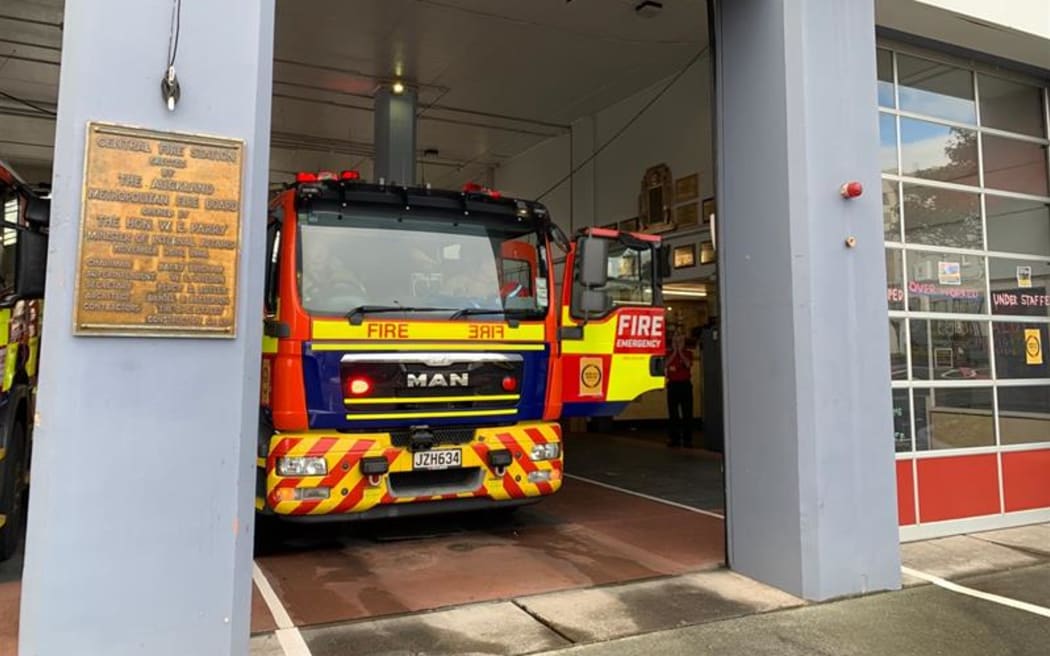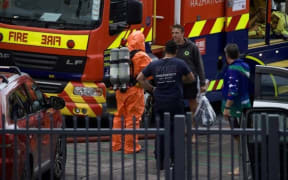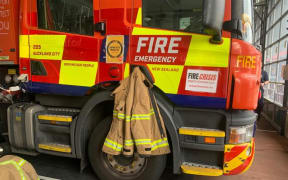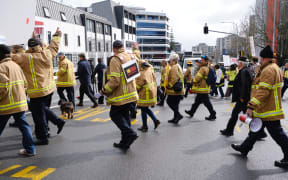
A fire engine parked at Auckland's Central Fire Station (file picture). Photo: RNZ / Rayssa Almeida
Fire and Emergency has admitted it has known for two years about asbestos in its Auckland Central Fire Station, which had to be evacuated on Thursday after dust generated during renovation work tested positive for the deadly substance.
In response to questions from RNZ, the organisation said it carried out an asbestos survey in 2021 of 497 of its properties built before the year 2000. A further 162 workplaces were not surveyed either due to having no buildings that were built before 1 January 2000, or due to not having any buildings to survey.
Asbestos or asbestos containing materials were found in 64 percent of them, and asbestos management plans were put in place for each site, including Auckland City Station.
Deputy chief executive Sarah Sinclair said Fire and Emergency was unable to say whether contractors were informed of the presence of asbestos nor why firefighters were allowed to stay in the building while renovations were underway.
"This incident will be investigated through Fire and Emergency's health and safety processes."
Of the asbestos containing materials items identified, none were scored as "high risk" and those scored as medium risk were "largely at the lower end of the category", she said in a statement in response to RNZ's questions.
"Where a workplace survey identified asbestos, Fire and Emergency has developed workplace Asbestos Management Plans (AMP).
"A workplace AMP outlines how we will manage and control any asbestos containing material identified by the asbestos survey.
"Where a recommendation by the asbestos expert was more than 'manage and re-inspect periodically', Fire and Emergency has followed the expert's recommendation, including putting in place programmes for removal of asbestos."
Each asbestos management plan was "constantly updated" as work was done.
Each workplace AMP is constantly updated as work is done to identify, confirm and manage ACM.
"The health and safety of all Fire and Emergency staff and volunteers is a top priority for our organisation," Sinclair said.
Professional firefighters' union commissions its own advice and testing
The professional firefighters' union said it was appalled that its members had been exposed to asbestos in their own workplace.

Professional Firefighters' Union national secretary Wattie Watson Photo: Supplied/ Nudo Group
National secretary Wattie Watson said there were serious questions to be answered - especially as the renovations had been on for the last six months.
"Like who made the decision that it was acceptable to have the firefighters accommodated there?"
The union had commissioned its own independent specialist advice and testing because it did not trust Fire and Emergency's processes, she said.
"We have also ensured air monitoring is being conducted post specialist cleaning. Once we have the results and recommendations from the experts we will be able to advise members of the necessary actions moving forward. "
Auckland Central Fire Station also accommodating Parnell crews
The Auckland City station had been also been accommodating Parnell crews while their own station was renovated.
"Over the past six months renovations had been undertaken on the top floor to provide suitable accommodation for the Parnell crews. Additional work was then being undertaken on the second floor where the city firefighters were housed.
"Contractors have been drilling in the accommodation area which is currently being used over the past two days. It was a sample taken from drilling in a locker where the asbestos was confirmed."
Watson said it was on-duty crews and health and safety representatives who moved quickly to minimise exposure after the test result was confirmed.
WorkSafe was immediately notified, crews evacuated and the trucks brought back to the station and taken off line.
"This was done in the absence of senior management on site and the NZPFU had to request an executive officer attend. The HSR organised expert advice on immediate decontamination processes and further testing and monitoring requirements," Watson said.
"We have notified FENZ we will be seeking answers and accountability for the exposure. The questions include whether any asbestos management plan was in place and adhered to, what testing prior to and monitoring during renovations was taken for asbestos and other particles/dust to ensure the safety of all those in the area, and on what grounds FENZ determined it was appropriate to continue to use the accommodation area and the station while renovations were being undertaken."
The union was advising anyone who had been at the city station or used one of its appliances or equipment in the last six months to register their exposure to asbestos and seek advice from their GP.
It has asked FENZ provide an independent medical expert to be able to advise staff and provide psychological support to those who have been exposed.
"Those currently accommodated at City Station have personal and FENZ-issued clothing and belongings that have been contaminated," Watson said.
"The Auckland Local is relying on expert opinion to determine the best practice for decontamination and cleaning, and how members will be compensated if their personal belongings cannot be cleaned to the standard of best practice."





